Johann Lamont resignation: Scottish Labour leader stands down immediately
- Published
- comments
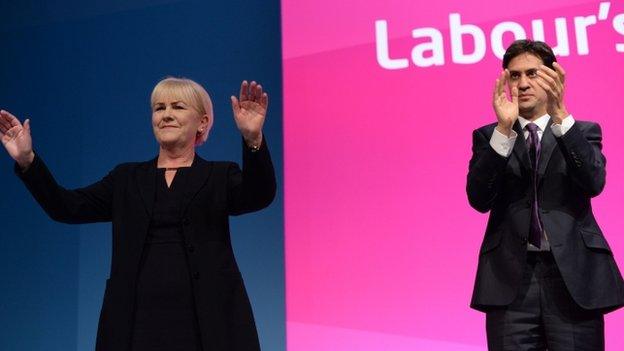
Johann Lamont and Ed Miliband appeared on stage at the Labour Party conference
Scottish Labour leader Johann Lamont has resigned with immediate effect after accusing the UK party of treating Scotland like a "branch office".
The 56-year-old MSP indicated that she had "had enough".
Ms Lamont was also angry that key decisions, including the removal of Scottish Labour general secretary Ian Price, were made without her input.
MP Anas Sarwar has become interim leader of the party north of the border while a successor is being chosen.
In a statement, he thanked Ms Lamont and said he and his colleagues would continue to hold both the government at Holyrood and the government at Westminster to account.
Labour has 41 MPs in Scotland who will fight for their Westminster seats at next May's General Election. The party also has 38 MSPs in Edinburgh's Holyrood parliament and they will seek re-election in 2016.
Former Scottish Labour first ministers, Henry McLeish and Jack McConnell, spoke to the BBC about the big problems that now faced their party.
Lord McConnell said he was "very, very angry" and insisted that the UK leadership had serious questions to answer. Mr McLeish said Scottish Labour was facing a crisis following a decade of decline.
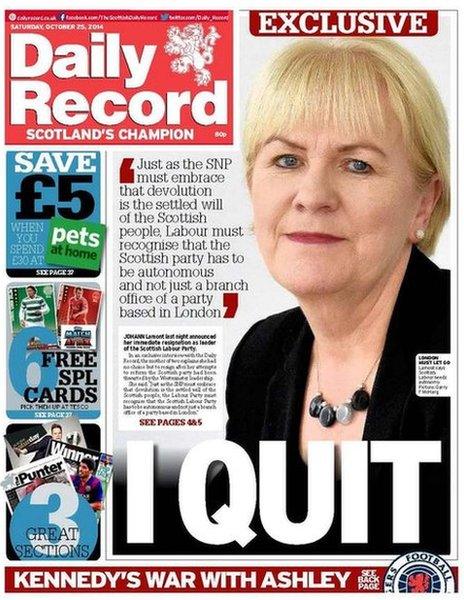
In an interview with the Daily Record, external, Ms Lamont described some Labour MPs as "dinosaurs" who failed to recognise that "Scotland has changed forever" after September's referendum.
She told the newspaper: "Scotland has chosen to remain in partnership with our neighbours in the UK. But Scotland is distinct and colleagues must recognise that.
"There is a danger of Scottish politics being between two sets of dinosaurs - the Nationalists who can't accept they were rejected by the people, and some colleagues at Westminster who think nothing has changed."
Ms Lamont, who became leader in December 2011, went on: "Party members up and down the country, voters on the doors, have spoken to me about the change they want. And that's a Scottish Labour Party which reflects their views. That's what I have been trying to build.
"However, some wanted me to become the issue. The Scottish Labour Party and its renewal are more important than me. That's why I am standing down - so that debate our country demands can take place."
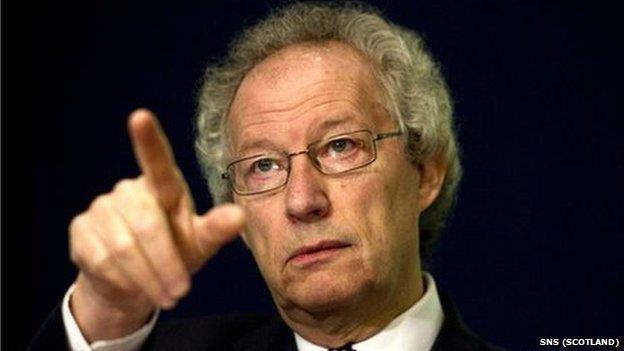
Henry McLeish: "This crisis in Labour didn't happen yesterday"
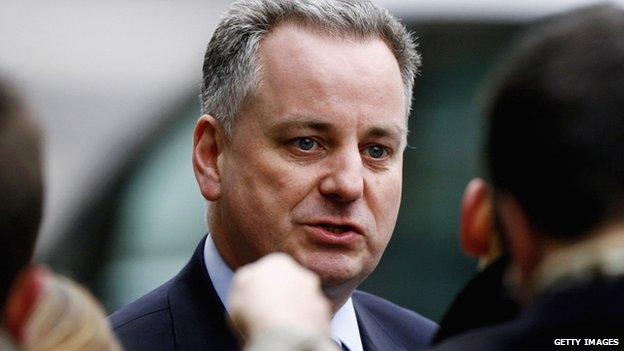
Jack McConnell: "She [Ms Lamont] clearly blames today publicly Ed Miliband"
In her resignation letter to Jamie Glackin, chair of the Scottish Labour Party, she said: "In order that we can have the real discussion about how we take Scottish Labour forward, I believe it would be best if I took myself out of the equation and stepped down as leader."
Mr McLeish, who was Labour first minister between 2000 and 2001, told the BBC that the resignation was evidence of his party in crisis.
Speaking to BBC Radio Scotland's Good Morning Scotland programme, he said: "This crisis in Labour didn't happen yesterday - this has been a decade now of decline.
"We've seen that they [Labour] have failed to match the other parties in terms of devolution commission reports and of course we have had this suffocating control of Westminster during this period. And this leads to the need for a very different modern Labour Party as we go ahead."
Lord McConnell, who was leader of Scottish Labour between from 2001 to 2007, echoed Mr McLeish's words adding that Mr Miliband had questions to answer.
He told BBC Radio Scotland: "She [Ms Lamont] clearly blames today publicly Ed Miliband and those around him and that's a very serious accusation that requires answers, and it requires answers not just from him but from those closest to him.
"I have had my concerns for some time about the way in which the Scottish Labour Party was struggling to set out a vision for the 21st century and a positive vision that would take us from opposition back into power."

ANALYSIS
Brian Taylor
BBC Scotland political editor
There are two versions of this story. In one version, Scottish Labour's departing leader, Johann Lamont, accuses her Westminster colleagues - and, by implication, Ed Miliband - of undermining her and failing to grasp how much Scotland has changed. She says some of her MP colleagues are "dinosaurs".
The alternative version is that Johann Lamont wasn't up to the job - that she failed to counter the SNP, that she failed to modernise the party sufficiently to cope with a new Scotland where people are no longer prepared to back Labour as a duty, that she failed to attract new talent who might freshen up the party's portrait for the electorate in 2016, when Holyrood goes to the polls.

ANALYSIS
David Porter
BBC Scotland Westminster correspondent
Senior Labour sources have indicated that both the former Prime minister, Gordon Brown and the former Scottish Secretary , Jim Murphy, will be approached to see if they are willing to lead the Labour Party in Scotland.
If the two men refuse another scenario being canvassed is for a joint ticket between the MP Anas Sarwar and the MSP Kezia Dugdale.
Mr Sarwar would be the leader and would seek to improve relations between Westminster and Holyrood. Ms Dugdale would lead the group at Holyrood. One Labour source described this as the "ideal option".
Others believe Mr Murphy should be encouraged to stand. One figure said that if "Jim doesn't stand it will be a disaster", but added he believed the shadow cabinet member could be persuaded.

Ms Lamont had wanted more autonomy for the party in Scotland and significant new powers for the Scottish Parliament.
But she felt both of those objectives were being thwarted by some of her Westminster colleagues, and accused them of putting their own interests ahead of those of Scotland.
Ms Lamont's Daily Record interview said: "Any leader whose general secretary can be removed by London without any consultation is in an untenable position. That has to change."
The timetable for choosing a new leader will be set out soon.
In the meantime Mr Sarwar is in charge and an MSP will be chosen to stand in for Ms Lamont at Holyrood.
Former teacher
Whoever replaces her will become Scottish Labour's seventh leader since the Scottish Parliament was established 15 years ago.
Ms Lamont, a former English teacher who joined the Labour Party as a teenager, has represented the Glasgow Pollok constituency at Holyrood since 1999.
She took over as the party's Scottish leader in the aftermath of the 2011 Scottish Parliament election, when Labour suffered a crushing defeat at the hands of the SNP.
In the weeks after the independence referendum, she said she wanted to lead Labour to victory in the next Holyrood election in 2016 and become first minister.
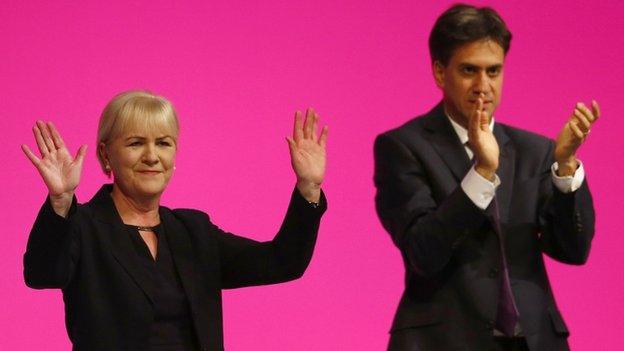
Ms Lamont has been critical of what she sees as meddling by the UK Labour party in the running of Scottish Labour
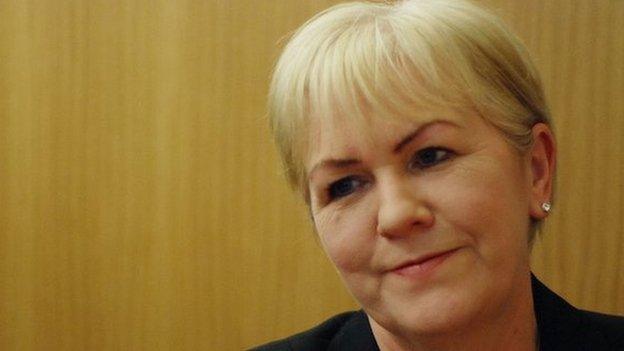
And she called on her Westminster colleagues to put Scotland's interests ahead of their own
Responding to Ms Lamont's resignation, Mr Miliband said she deserved "significant credit" for the successful "No" vote in the Scottish referendum campaign.
He added: "She campaigned the length and breadth of Scotland making the case for social justice within the United Kingdom.
"She has led the Scottish Labour Party with determination. I know she will continue to serve her constituents.
"Having elected a new leader, I believe the party will show the same will and determination it did in the referendum campaign to help us to victory in the general election of 2015 and the Scottish elections of 2016."
New leader names
Ms Lamont is the second Scottish party leader to resign following the referendum after First Minister Alex Salmond decided to step down from his role.
Mr Salmond will be replaced as first minister and SNP leader by deputy Nicola Sturgeon at their party conference in Perth next month, but it is much less clear who will succeed Ms Lamont as Scottish Labour leader.
Former prime minister Gordon Brown has constantly been linked to the job, as has fellow MP Jim Murphy, who also played a prominent role in the referendum campaign.
BBC Scotland's Westminster correspondent David Porter said Labour Party sources had told him that both Mr Brown and Mr Murphy would be approached and asked to stand.
Mr Sarwar will also be seen as a candidate, along with a number of prominent MSPs, including Kezia Dugdale, Neil Findlay and Drew Smith.

Jim Murphy (left) and Gordon Brown have been tipped as potential successors to Ms Lamont
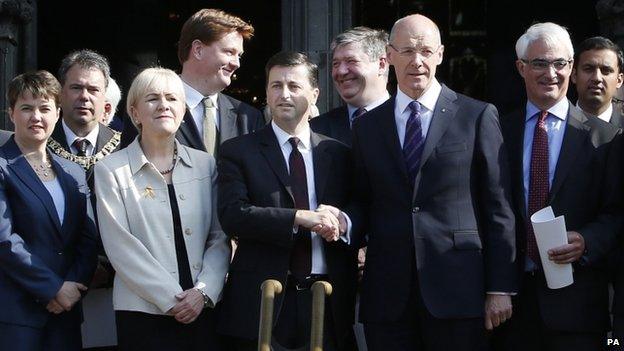
Johann Lamont joined her Labour colleagues at a service of reconciliation after the referendum
Mr Brown said he was sorry to hear that Ms Lamont had resigned.
He added; "She brought determination, compassion and a down-to-earth approach to the leadership and deserves great credit for taking on the challenge after 2011.
"I wish her well in the future."
Reacting to news of the resignation, Ms Sturgeon said that Ms Lamont "carries my personal best wishes",
But she added: "There is no question that her shock resignation reveals Labour to be in complete meltdown in Scotland."
'Values and principles'
Green MSP Patrick Harvie, who is part of the Smith Commission discussing further devolution for Scotland, said: "I'd like to wish her well and express hope that those seeking change within the Scottish Labour Party can make progress.
"Scottish voters deserve to have the option of an effective Labour Party which can advocate the values and principles which its UK leadership has sadly long ago surrendered."
A Scottish Conservative spokesman said: "Johann Lamont's resignation has shown the complete chaos at the heart of Ed Miliband's operation in the starkest possible terms. The man isn't fit to run a village fete, never mind the UK."